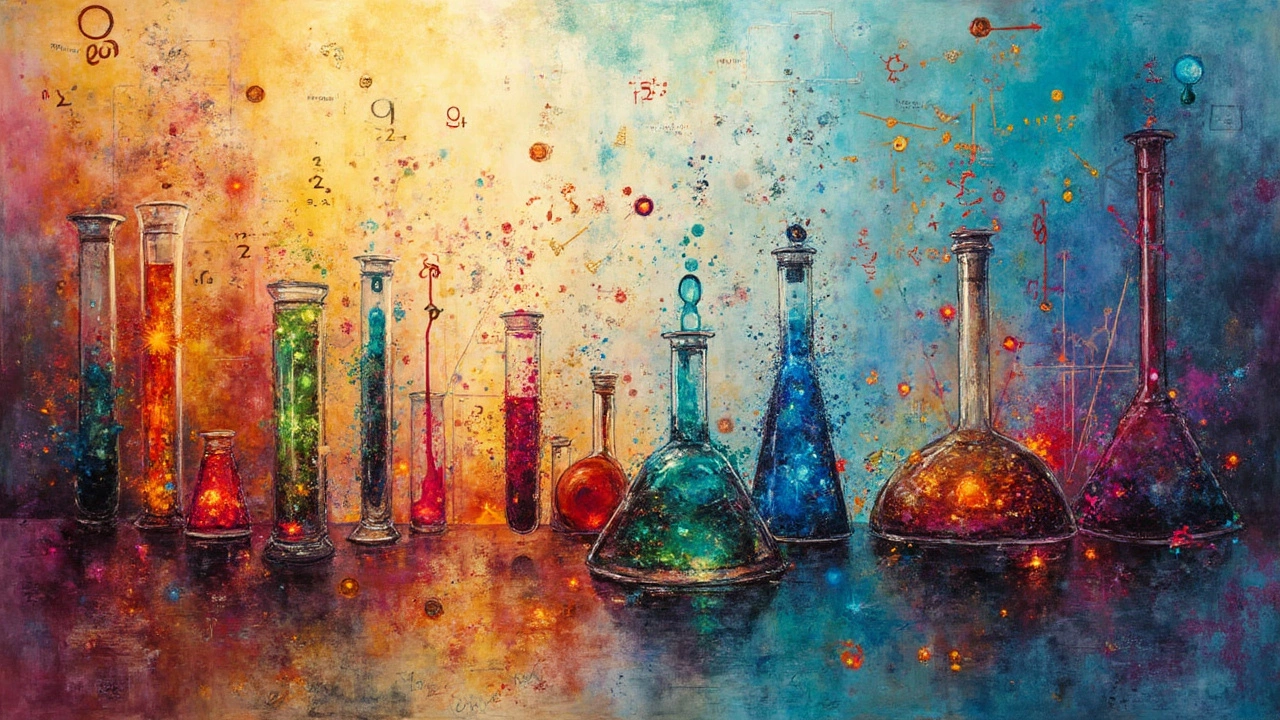The Joint Entrance Examination, or JEE, is a beast. It’s what stands between hopeful engineers and the prestigious IITs. Now, while JEE tests your skills across Physics, Chemistry, and Mathematics, one of these tends to give students more headaches than the others. Let's explore which one it might be.
Physics sounds like fun when you get to blow things up in the lab, but the theory and problem sets can be absolute brain-busters. It’s all about concepts. If you aren’t clear on them, Physics can feel like learning a new language. On the other hand, there’s Chemistry. You might think mixing chemicals sounds cool until you're knee-deep in organic reactions and the periodic table, and every little detail starts to look the same.
And don’t even get me started on Mathematics. While numbers might be straightforward, the complexity of the problems can ramp up quickly, turning what seems like a simple calculation into a mind-melting puzzle.
- Breaking Down the JEE Exam
- The Case for Physics
- The Chemistry Challenge
- Mathematics: The Numbers Game
- What Students Say
- Strategies for Success
Breaking Down the JEE Exam
The JEE is one of the toughest entrance exams out there. It’s basically your gateway to the top engineering colleges in India, including the IITs. But what exactly makes it so challenging? Let’s pull back the curtain.
The JEE is split into two parts: JEE Main and JEE Advanced. Think of JEE Main as the qualifying round. A good rank here opens the door to appear for JEE Advanced, which is where the real grind happens.
JEE Main tests your understanding of class 11 and 12 standard Physics, Chemistry, and Mathematics. It's held multiple times a year, and students can choose to appear as many times as they'd like, with their best score being considered.
Now, JEE Advanced, that’s a different animal. It digs deeper into the same subjects but at an almost ungodly level of complexity. Here, instead of straightforward questions, you encounter complex problems that push your conceptual understanding to the limit.
- Physics often involves wrapping your head around tricky concepts and applying them to unfamiliar scenarios.
- Chemistry can be divided into Physical, Organic, and Inorganic, each with its own set of challenges. Organic Chemistry is notorious for its reaction mechanisms.
- Mathematics in JEE can often feel like solving puzzles – it's about patience and understanding the intricacies of each topic.
If you've got a knack for numbers, understanding Chemistry well enough not to mistake atomic numbers for birthdays, and love a good challenge in Physics, then you're cut out for JEE.
In 2023, over 1.6 million students appeared for JEE Main. That’s some serious competition! Understanding this kind of scale is important because it highlights why preparation and strategy are key to acing these exams.
The Case for Physics
When it comes to the JEE subjects, Physics often gets a reputation for being the most mind-bending. One minute you're calculating the trajectory of a projectile, and the next you're deep into the laws of thermodynamics. It's a subject that's not just about crunching numbers—it's about understanding the 'why' and 'how' of the world we live in.
Physics in JEE isn't just about memorizing formulas; it's about applying them in innovative ways. That's where many students stumble. Unlike Mathematics, which is mostly logic-based, or Chemistry, which can be more about recalling facts, Physics demands a bit of everything: intuition, analytical thinking, and sometimes even a splash of creativity.
Consider some of the infamous JEE problems: questions that start with innocuous scenarios like a block sliding down an incline and escalate to require multiple steps of calculations involving gravity, friction, and sometimes electromagnetism. These exercises test your understanding of principles and how well you can weave them together.
Why is Physics considered tough? Because it pushes you to think on your feet. A survey conducted in 2022 among JEE aspirants revealed that about 55% found Physics to be the hardest, usually because the problems felt like they required a complex web of concepts intricately linked together.
But don’t sweat it just yet. Tackling Physics is all about strategy:
- Conceptual Clarity: Before diving into problem sets, ensure your basics are rock solid. If you're shaky on concepts, everything else falls apart.
- Practice: Solve as many different types of problems as you can. The more varied the questions, the better prepared you'll be.
- Mock Tests: Timed mock tests simulate real exam pressure and help identify weak spots.
Considering IIT JEE preparation, it might feel intimidating, but remember, every genius you admire started understanding Physics one small step at a time. Grasp the fundamentals, build up to the complex stuff with practice, and you'll find yourself conquering even the trickiest Physics problems.
The Chemistry Challenge
Ah, Chemistry. At first glance, it seems like a mix of Art and Science, doesn't it? But when it comes to JEE subjects, Chemistry's a bit of a rollercoaster, looping from the fascinating to the downright complex. On one hand, you've got Chemical Reactions, like a giant jigsaw puzzle, and on the other, the abstract world of Organic Chemistry, which can feel like decoding a secret language.
Now let's dig into why Chemistry often feels tougher than it looks. Chemistry for JEE is divided into three main branches: Physical, Organic, and Inorganic. For starters, Physical Chemistry involves calculations and concepts that need sharp problem-solving skills. Ever heard of equilibrium or thermodynamics? Mastering these is key, and it isn’t always a walk in the park.
Then we have Organic Chemistry. It’s infamous for its reactions and mechanisms. The key to acing Organic Chemistry lies in pattern recognition. Compounds react in specific ways, and if you learn to spot these patterns, you’re golden. But until you do, it’s intimidating.
Finally, there's Inorganic Chemistry, which is less about creativity and more about memorization. You have to know properties, trends, and reactions. And yes, that periodic table will be your close friend.
To sum it up, Chemistry in the IIT JEE preparation isn’t just one type of challenge. Mastery comes from understanding theories, practicing problems, and memorizing facts. Here are a few tips:
- Break down the subject into its branches and tackle each one individually.
- Use visual aids for Organic Chemistry. Diagrams work wonders.
- For Physical Chemistry, practice through problems—it’s like learning a sport.
- Stick to the NCERT book for Inorganic Chemistry; it's comprehensive and JEE-focused.
Want a little motivational boost? According to a 2023 survey, 60% of students found Chemistry more conquerable once they focused on understanding basic concepts rather than rote memorization.

Mathematics: The Numbers Game
Math can be a wild ride, especially in the JEE context. Tackling Mathematics requires both a quick mind for problems and a thorough understanding of complex concepts. This subject often includes a variety of topics, like calculus, algebra, trigonometry, and geometry. Calculus, in particular, tends to trip up many students with its detailed focus on derivatives and integrals.
One of the reasons Mathematics might be seen as the toughest subject in the JEE is its breadth. Students need to cover a lot of ground, sometimes stretching from basic formulas to advanced theorems. Algebra can get especially challenging with quadratic equations and matrices.
To conquer JEE Mathematics, here are a few tips:
- Practice extensively: The more problems you solve, the more familiar you'll become with different types of questions.
- Understand your mistakes: Don't just correct errors, analyze why you made them and how to avoid them in the future.
- Use mock tests: Simulating the exam environment can help you manage time and build confidence.
Here’s a little glimpse at how these topics weigh in the exam:
| Topic | Approximate Weightage |
|---|---|
| Calculus | 30% |
| Algebra | 25% |
| Trigonometry | 10% |
| Geometry | 15% |
That weightage can shift slightly, but it's a good general idea of where to focus. Deep diving into practice, while keeping an eye on time and detail, is essential. With the right strategies and dedicated practice, Mathematics can become more of a friend than a foe on your JEE journey.
What Students Say
If there's anyone who can tell us which subject is the toughest in the JEE, it's the students who've walked through the fire. Many students often pinpoint Physics as the brain teaser of the three. The abstract concepts and need for a strong grasp on fundamentals make it a daunting task for many. For others, the visual interpretation and real-world application of Physics make it less taxing than the memory-reliant Chemistry.
Chemistry, especially its organic part, often sends shivers down students' spines. It's almost unanimously agreed that memorizing endless reactions is no less than a Herculean task. Students describe feeling like detectives piecing together clues with too many unknowns.
Mathematics brings its own mix of anxiety and intrigue. While it’s logical and structured, its complexity increases with topics like calculus. Yet, some students find solace in that logic, claiming it to be the subject where practice truly makes perfect.
According to a recent student survey, about 40% find Physics the hardest, with Chemistry following closely at 35%, while Mathematics appears manageable for the majority at around 25%.
| Subject | Perceived Difficulty (%) |
|---|---|
| Physics | 40% |
| Chemistry | 35% |
| Mathematics | 25% |
Ultimately, personal experiences with JEE prep tell us that difficulty is subjective. It really boils down to an individual's strengths and weaknesses. But hearing what others say gives valuable insight and helps set realistic expectations.
Strategies for Success
Tackling the toughest JEE subjects is no walk in the park, but with the right approach, you can come out on top. Let's break it down into simple steps you can follow to boost your preparation game.
First, understand the exam pattern. Knowledge is power, right? Dive deep into past papers to get a feel for what’s often asked. It’s about getting familiar with the question style, not just the questions themselves.
Second, prioritize your study plan. It's crucial to figure out which topics give you the most grief and allocate extra time for them. For instance, if Mathematics is your nemesis, spend a bit more time wrestling with those problems daily.
- Start with the basics. Build a strong foundation by revisiting earlier concepts regularly.
- Practice regularly. Solve as many sample papers and mock tests as you can.
- Seek help when stuck. Don’t hesitate to ask teachers or peers when things don’t make sense.
- Make concise notes. Jot down key points and formulas in a way that makes sense to you.
- Take breaks and stay healthy. Overloading your brain without breaks can do more harm than good.
Interestingly, students who engage in regular peer study groups tend to perform 15% better in their exams. It’s amazing what a little collaboration can do!
And don't just stick with textbooks. Online resources, videos, and tutorials offer different perspectives that might help you grasp challenging concepts more effectively. Remember, the goal is to make the preparation less daunting and more about consistent, focused effort.
